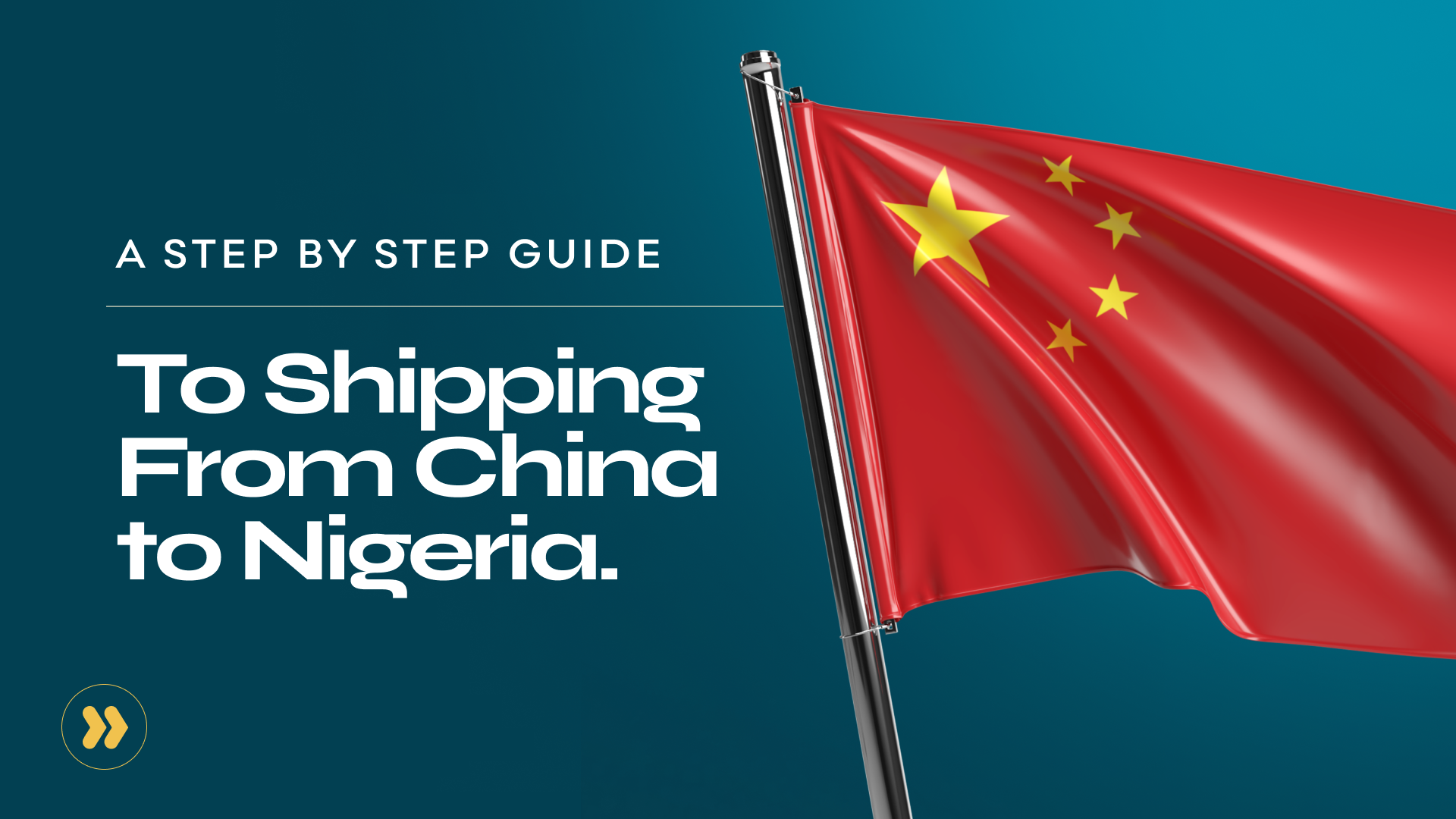A Comprehensive Guide To Shipping From China to Nigeria

If you follow the Heroshe Instagram page, you must have come across Dolapo's handle in the comments section. There is something you don't know about her, though. She is an ambitious entrepreneur based in Lagos, Nigeria, with a keen eye for opportunity. She runs a spa and relies on Heroshe to ship from the US to Nigeria. Now, she is eyeing a wig business expansion and faces a decision: Should she source her stock from the United States, or should she explore the enticing offers from China? And as expected, she has been blowing up our DMs, asking when we will start shipping from China to Nigeria. Very soon, Dolly P. Very soon!
As Dolapo contemplates her next move, she's not alone in her quest for efficient shipping solutions from China to Nigeria. This guide explores insights, tips, and everything you need to know about shipping goods from China to Nigeria. We will also introduce you to reliable shipping companies who ship your goods to your doorstep in Nigeria at affordable prices. So, whether you are a budding entrepreneur like Dolapo or a seasoned importer looking to streamline your operations, join us as we walk you through the process.

Why Should You Consider Shipping From China To Nigeria?
China and Nigeria have enjoyed diplomatic relations since 1971 and have since become strategic partners. Nigeria, being a significant source of oil and petroleum, has found support from China in its economic development. In 2018, Nigeria joined China's Belt and Road Initiative, strengthening its economic ties and paving the way for increased Chinese investments. As a result, China has become Nigeria's largest trading partner among African countries, with imports from China accounting for a significant portion of Nigeria's total imports.
Here are four other reasons to consider shipping from China to Nigeria:
Cost-effectiveness
Shipping from China to Nigeria is often cheaper than other international shipping routes. We all know China for its manufacturing capabilities and efficient logistics network. So, if you are a business owner looking to import goods into Nigeria without inflating their operational expenses, this is your sign.
Wide Range of Products
China boasts a wide range of products, from electronics and textiles to machinery and consumer goods. This large product selection makes it an attractive sourcing destination for Nigerian businesses. By shipping directly from China, you can access a broad range of products to cater to your customers' preferences and needs.
Quality Assurance
If you are one of those people who think ‘Made in China’ represents fake products, let me burst your bubble. Many Chinese manufacturers have improved their standards in recent years to meet international requirements and certifications. By shipping from China, you can leverage the competitive pricing offered by Chinese suppliers without compromising on product quality. You can also establish partnerships with reputable manufacturers and conduct thorough quality checks.

Market Competitiveness
Staying competitive requires businesses to optimize their supply chain and sourcing strategies. Shipping from China to Nigeria allows you to access cost-effective products, maintain high-quality standards, and streamline your operations. By capitalizing on China's manufacturing prowess and efficient shipping infrastructure, businesses in Nigeria can gain a strategic edge and position themselves for success in their respective industries. This advantage is further underscored by the fact that in December 2023, China exported $1.81 billion worth of goods, highlighting the vast opportunities for Nigerian businesses to tap into China's robust export market and make them more competitive in their market.
Related: The Complete Guide to Sourcing in China
How To Ship From China to Nigeria?
Many of the things we buy in Nigeria come from other countries, especially China. There are countless items you can bring in from China to Nigeria. But to make it happen, there are certain steps you need to follow to ship goods from a port in China to one in Nigeria. Here is a step-by-step breakdown of what you need to do when it comes to shipping:
Step 1: Research and Identify Products
Before you ship to Naija from China, you should research the Nigerian market. Start by analyzing market trends, consumer preferences, and demand in Nigeria. Identify the goods you wish to import, their quantity, and any specific regulations or restrictions imposed by Nigerian customs authorities. Determine your budget and explore different shipping options to find the most suitable one for your needs. Understand the demand trends, consumer preferences, and potential competitors.
You should also have an idea of the products that have a high demand in Nigeria and are readily available in China. This research phase will provide valuable insights into which products are most likely to succeed in the Nigerian market.
Step 2: Find Reliable Suppliers
Finding reliable suppliers in China is essential for the success of your import venture. Start by researching suppliers on reputable online platforms like Alibaba or Global Sources. Look for suppliers with a proven track record of reliability, quality, and timely delivery. Reach out to multiple suppliers to compare prices, negotiate terms, and ensure you're getting the best deal possible.
Once you have identified potential suppliers, communicate with them to discuss pricing, minimum order quantities, and terms of trade. Request product samples to assess quality before committing. Selecting a reputable supplier in China is crucial to ensure the quality and timely delivery of your goods. Communicate clearly with the supplier regarding product specifications, pricing, and shipping arrangements.
RELATED: The 2024 Guide To Finding The Best Suppliers In The US, China & Dubai
Step 3: Obtain Necessary Documentation
Shipping from China to Nigeria involves various documentation and customs clearance procedures. It's essential to ensure that you have the necessary paperwork to avoid delays or issues at customs. Here are some key documents required for shipping:
Commercial Invoice: A detailed invoice that includes the description, quantity, and value of the goods being shipped.
Bill of Lading or Airway Bill: A document issued by the shipping company or airline that serves as proof of shipment and contract of carriage.
Packing List: A detailed list of the contents and packaging specifications of the shipment.
Certificate of Origin: A document that certifies the origin of the goods being shipped.
Import and Export Licenses: Depending on the nature of the goods, certain products may require import or export licenses or permits.

Step 4: Choose the Shipping Method
There are several shipping methods available for transporting goods from China to Nigeria, including air freight, sea freight, and courier services. Consider factors such as cost, transit time, and the nature of your goods when selecting the most appropriate shipping method for your shipment.
Select a shipping method that best suits your needs, considering factors such as speed, cost, and reliability. When it comes to shipping from China to Nigeria, there are primarily two methods: sea freight and air freight. Each method has its advantages and considerations, depending on factors such as cost, transit time, and the nature of the goods being shipped.
Sea Freight: Sea freight is often the preferred method for shipping large quantities of goods from China to Nigeria. It offers a cost-effective solution, especially for bulky or heavy shipments. However, it is important to note that sea freight is generally slower compared to air freight. The transit time for a shipment from China to Nigeria by sea can range from 30 to 45 days, depending on the specific route and the chosen shipping company.
Air Freight: For time-sensitive shipments or goods with a higher value, air freight is the preferred option. Although air freight is generally more expensive than sea freight, it offers faster transit times, often delivering goods from China to Nigeria within a week. Airports are also more accessible than seaports, making it convenient for shipments destined for locations further inland.
Step 5: Choose a Reliable Shipping Company
If you are unfamiliar with international shipping procedures, consider partnering with a reputable shipping company experienced in handling shipments from China to Nigeria. These companies, also called freight forwarders, can assist with customs clearance, transportation, and documentation, simplifying the shipping process and ensuring compliance with regulations. Here are some factors to consider when choosing a shipping company:
Experience and Reputation: Look for shipping companies with extensive experience and a solid reputation in handling shipments between China and Nigeria. Read reviews and seek recommendations from trusted sources.
Services Offered: Consider the range of services offered by the shipping company, including customs clearance, tracking capabilities, insurance options, and customer support.
Cost and Pricing Transparency: Compare the rates and fees offered by different shipping companies to ensure competitive pricing. Additionally, ensure that the company provides transparent pricing and clearly outlines any additional charges or surcharges.
Network and Coverage: Check if the shipping company has a robust network and coverage in both China and Nigeria. This ensures efficient handling and delivery of your shipment.
Documentation and Customs Expertise: Verify that the shipping company has expertise in handling the necessary documentation and customs clearance procedures for shipments between China and Nigeria.

Step 6: Handle Customs Clearance
Before your goods can enter Nigeria, they must undergo customs clearance procedures. Prepare all necessary documentation accurately and in advance to facilitate customs clearance in Nigeria. This includes commercial invoices, packing lists, certificates of origin, and any permits or licenses required. Work with your freight forwarder or customs broker to prepare and submit the necessary documentation to Nigerian customs authorities. Be prepared for potential delays or inspections during the clearance process.
Step 7: Pay Duties and Taxes
Import duties, taxes, and other fees may apply to your shipment depending on the nature and value of the goods. Familiarize yourself with Nigeria's import regulations and budget accordingly for any additional costs. Ensure that all duties and taxes are paid promptly to avoid delays or penalties.
Step 8: Monitor Shipment Progress
Stay informed about the status of your shipment by tracking its progress online or through your freight forwarder. Communicate regularly with the shipping carrier and be prepared to address any issues or delays that may arise during transit.
Step 9: Receive Goods and Arrange Delivery
Once your shipment arrives in Nigeria, coordinate with your local customs broker or freight forwarder to arrange for clearance and delivery to your final destination. Inspect the goods upon receipt to ensure that they match the provided documentation and are in satisfactory condition.
Types of Shipping from China to Nigeria
Shipping from China to Nigeria involves several types of shipping methods, each with its advantages and considerations. Here are some common types of shipping options available:
Ocean Freight
Ocean freight is the most common and cost-effective method for shipping goods from China to Nigeria, especially for large or bulky items. There are two main options for ocean freight:
Full Container Load (FCL): With FCL, the entire container is reserved for one shipper's goods. This option is suitable for large shipments or when you need to transport goods that require the entire container space.
Less than Container Load (LCL): LCL involves sharing a container with shipments from other exporters. It's a cost-effective option for smaller shipments that don't require a full container. However, transit times may be longer as the container needs to be consolidated and deconsolidated at various ports.
Air Freight
Air freight is faster than ocean freight and is suitable for time-sensitive or high-value shipments. While air freight is more expensive than ocean freight, it offers shorter transit times, making it ideal for perishable goods, electronics, or urgent deliveries.
Door to Door Shipping
Courier services like DHL, FedEx, and UPS offer door-to-door shipping solutions from China to Nigeria. These services are convenient for smaller shipments and provide faster delivery times compared to traditional freight options. The major advantage of this type of shipping is that they handle everything from customs clearance to delivery at a location of your choice.
How Much Does It Cost to Ship From China to Nigeria?
The cost of shipping from China to Nigeria can vary depending on several factors, including the chosen shipping method, the weight and volume of the goods, and any additional services required. You should consider these factors when calculating the overall cost of your shipment.
For sea freight, the cost is typically calculated based on the volume or weight of the cargo, known as the freight tonnage. The specific rates may vary among shipping companies, so it's advisable to request quotes from multiple providers to compare prices.
Air freight costs are generally higher compared to sea freight due to the faster transit times and higher handling costs associated with air transportation. The cost is typically calculated based on the chargeable weight, which considers the actual weight or volumetric weight, whichever is higher.
To get an accurate estimate of shipping costs, contact shipping companies or freight forwarders specializing in China-Nigeria routes and provide them with detailed information about your shipment.

What are Important Incoterms to Remember When Shipping from China to Nigeria?
When shipping goods from China to Nigeria, understanding and using the appropriate Incoterms is crucial for a smooth and efficient transaction. Incoterms, short for International Commercial Terms, are globally recognized standards that define the responsibilities of buyers and sellers in international trade transactions. Here are some key Incoterms to remember:
EXW (Ex Works):
Under EXW, the seller's responsibility is minimal. They make the goods available at their premises in China, and the buyer bears all costs and risks from that point onwards, including transportation, export clearance, and import duties in Nigeria.
FOB (Free on Board):
With FOB terms, the seller is responsible for delivering the goods to the port of shipment in China and covering export clearance. Once the goods are loaded onto the vessel, the responsibility shifts to the buyer, who bears all costs and risks from that point, including transportation to Nigeria, import duties, and unloading at the destination port.
CIF (Cost, Insurance, and Freight):
CIF terms include the cost of goods, insurance, and freight to transport the goods from China to Nigeria. The seller is responsible for arranging and paying for transportation and insurance to the destination port in Nigeria. However, once the goods are loaded onto the vessel, the risk transfers to the buyer. Import duties and other costs in Nigeria are the buyer's responsibility.
CFR (Cost and Freight):
Similar to CIF, CFR terms involve the seller covering the cost of transportation to the port of destination in Nigeria. However, under CFR, the seller is not required to provide insurance for the goods during transit. Once the goods are loaded onto the vessel in China, the risk transfers to the buyer, who must arrange for insurance and cover import duties upon arrival in Nigeria.
DDP (Delivered Duty Paid):
DDP terms represent the maximum obligation for the seller. The seller is responsible for delivering the goods to the buyer's premises in Nigeria, covering all costs, including transportation, insurance, import duties, and any other charges. The buyer's responsibility begins only after the goods have been unloaded at the designated location.
How Much is Import Duty in Nigeria?
Import duties in Nigeria constitute a significant aspect of international trade transactions, with rates varying across different items, typically ranging from 5% to 35%. These duties are meticulously assessed with reference to the prevailing Harmonized Commodity and Coding System (HS code), a globally recognized system for classifying traded products. Here's an in-depth look at how import duties are structured in Nigeria:
Basic Customs Duty (BCD):
Basic customs duty is the primary duty levied on imported goods and is calculated as a percentage of the customs value (CIF - Cost, Insurance, and Freight) of the goods. The rates of basic customs duty can range from 0% to 35%, depending on the nature of the goods. Essential items such as raw materials may attract lower duty rates, while luxury goods may have higher rates.
Excise Duty:
Excise duty is typically applied to specific goods such as alcoholic beverages, tobacco products, and certain luxury items. The rates of excise duty can vary widely and are often based on the quantity or volume of the goods imported.
Value Added Tax (VAT):
In addition to customs duties, imported goods are also subject to Value Added Tax (VAT) in Nigeria. VAT is currently set at a standard rate of 7.5% but may vary for certain goods or be exempted altogether based on government policies.
Tips to Reduce The Costs Of Shipping From China To Nigeria
Here are some cost-saving tips to consider when shipping goods from China to Nigeria:
Obtain multiple quotations: Request quotations from different shipping companies to compare rates and find the most competitive price for your shipment.
Explore shipping options: Consider sea freight, air freight, or courier services to find the cheapest shipping method that meets your delivery time requirements.
Consolidate shipments: If possible, consolidate multiple smaller shipments into one larger shipment to take advantage of better shipping rates.
Optimize packaging and container usage: Efficient packaging and container utilization can reduce shipping costs. Make sure goods are properly packed and utilize container space effectively.
Utilize customs clearance expertise: Engage customs clearance experts or shipping companies experienced in navigating customs regulations to ensure smooth customs clearance, avoiding unnecessary delays or charges.

What Goods Can You Import From China to Nigeria?
Importing goods from China to Nigeria can be a lucrative venture due to the wide range of products available at competitive prices. Here is a list of goods commonly imported from China to Nigeria:
Electronics: This category includes smartphones, tablets, laptops, televisions, cameras, and other consumer electronics. China is known for producing high-quality electronic goods at affordable prices, making them popular imports in Nigeria.
Textiles and Apparel: China is a major manufacturer of textiles and clothing items. Nigerian importers often source items such as shirts, trousers, dresses, fabrics, and accessories like bags and shoes from Chinese suppliers.
Household Items: Various household items such as kitchenware, home décor, furniture, and appliances are commonly imported from China. These products offer a combination of affordability and quality, appealing to Nigerian consumers.
Toys and Games: China is a leading exporter of toys and games worldwide. Nigerian importers often bring in a variety of toys, puzzles, board games, and electronic games to cater to the demand in the Nigerian market.
Building Materials: Construction materials like tiles, sanitary ware, lighting fixtures, and hardware are frequently imported from China to Nigeria. These products are sought after for their competitive pricing and diverse range.
Automobile Parts: Nigeria's automotive industry relies heavily on imported parts, many of which are sourced from China. Engine components, body parts, tyres, and accessories are among the items commonly imported.
Machinery and Equipment: Industrial machinery, agricultural equipment, and construction machinery are also imported from China to support various sectors in Nigeria, including manufacturing, agriculture, and infrastructure development.
Cosmetics and Beauty Products: Chinese suppliers offer a wide range of cosmetics, skincare products, hair extensions, and beauty accessories. These items are popular imports in Nigeria due to their affordability and diverse options.
Stationery and Office Supplies: Stationery items like pens, notebooks, office supplies, and school supplies are commonly sourced from China. These products are in demand among students, businesses, and educational institutions in Nigeria.
Healthcare Products: With the growing health and wellness market in Nigeria, imports of healthcare products such as medical equipment, personal care items, vitamins, and supplements from China are on the rise.
What Are The Shipping Routes From China to Nigeria?
Shipping routes from China to Nigeria primarily involve maritime transport due to the geographical distance between the two countries. Here are the main shipping routes used for transporting goods from China to Nigeria:
Shanghai to Lagos: Shanghai, one of China's major seaports, serves as a key departure point for goods destined for Nigeria. Cargo ships departing from Shanghai navigate through the South China Sea, Indian Ocean, and around the Cape of Good Hope before entering the Atlantic Ocean and arriving at the port of Lagos, Nigeria's largest and busiest seaport.
Ningbo to Lagos: Ningbo, located in Zhejiang province, is another crucial port for shipping goods from China to Nigeria. Cargo vessels departing from Ningbo follow a similar route to those from Shanghai, traversing the South China Sea, Indian Ocean, and around the Cape of Good Hope before reaching Lagos port.
Guangzhou to Lagos: Guangzhou, a major manufacturing hub in southern China, is known for its trade ties with Africa, including Nigeria. Goods exported from Guangzhou are transported by sea through the South China Sea and the Indian Ocean, eventually arriving at Lagos port.
Qingdao to Lagos: Qingdao, situated along the eastern coast of China's Shandong province, also serves as a departure point for shipments to Nigeria. Cargo vessels departing from Qingdao follow a similar maritime route to other Chinese ports, making their way through the South China Sea, Indian Ocean, and around the Cape of Good Hope before reaching Lagos.
Tianjin to Lagos: Tianjin, located in northern China near Beijing, is one of the country's largest and busiest ports. Shipping routes from Tianjin to Lagos typically involve vessels navigating through the Yellow Sea, East China Sea, South China Sea, and Indian Ocean before arriving at the port of Lagos.
Top Shipping Companies Shipping From China To Nigeria
Several reputable shipping companies in Nigeria offer services from China to Nigeria, each with its strengths and specialities. Here are some of the top shipping companies often considered by importers:
Maersk Line: Maersk Line is one of the world's largest container shipping companies, offering reliable and comprehensive services from China to Nigeria. With a vast fleet of vessels and an extensive global network, Maersk provides a range of shipping solutions tailored to different cargo requirements.
MSC (Mediterranean Shipping Company): MSC is another leading container shipping company known for its extensive coverage and frequent sailings between China and Nigeria. MSC offers competitive rates, efficient transit times, and a range of value-added services for importers.
China Shipping Container Lines (CSCL): CSCL is a prominent shipping company offering services between China and Nigeria. With a focus on efficiency and reliability, CSCL provides a range of shipping solutions to meet the needs of importers, including both FCL (Full Container Load) and LCL (Less than Container Load) shipments.
Wan Hai Lines: Wan Hai Lines is a respected shipping company known for its expertise in the intra-Asia trade, as well as connections to Africa, including Nigeria. With a commitment to customer satisfaction and operational excellence, Wan Hai Lines offers competitive shipping options and efficient transit times for importers.
ZIM Integrated Shipping Services: ZIM is a global container shipping company offering services from China to Nigeria and beyond. With a focus on innovation and digitalization, ZIM provides reliable and technologically advanced shipping solutions tailored to the needs of importers, including online booking and tracking capabilities.
Whether you are looking for a shipping company to Nigeria, a shipping company to Nigeria from China, or simply planning a shipment to Nigeria, these companies offer reliable and efficient services to meet your needs.

What Is The Best Shipping Company From China To Nigeria?
The simple answer is Heroshe. Heroshe is your best option when shipping to Nigeria from China.
Heroshe is a Nigeria shipping company that has gained recognition for its focus on providing reliable, efficient, and personalized freight forwarding services from China to Nigeria. The company offers end-to-end logistics solutions, including procurement, consolidation, customs clearance, and door-to-door delivery, catering to the unique requirements of Nigerian importers. Heroshe's commitment to customer satisfaction, transparency, and innovation has earned it a loyal customer base and positive reviews within the industry.
Conclusion
In conclusion, shipping goods from China to Nigeria offers many opportunities for businesses like yours. From the bustling streets of Lagos to the vibrant markets across Nigeria, the demand for quality products continues to rise. Whether you are a budding entrepreneur like Dolapo, ready to expand your ventures, or a seasoned importer seeking to streamline operations, the journey from China to Nigeria holds immense promise.
At Heroshe, we understand the intricacies of international shipping and are dedicated to empowering businesses like yours to thrive. Our comprehensive guide has provided valuable insights, from choosing the right shipping method to navigating customs regulations and finding reliable suppliers. But this is just the beginning.
For even more invaluable tips, industry updates, and expert advice on shipping from China to Nigeria, subscribe to the Heroshe blog today. Stay ahead of the curve, unlock new possibilities, and embark on a seamless shipping journey with Heroshe by your side. Let's navigate the world of logistics together, ensuring love and swift delivery every step of the way.
Frequently Asked Questions About Shipping From China to Nigeria
How long does it take to ship from China to Nigeria?
Transit times for sea freight can range from 30 to 45 days, while air freight shipments typically arrive within a week.
How much does it cost to ship from China to Nigeria?
The cost of shipping depends on factors such as the chosen shipping method, weight, volume, and additional services required. Request quotes from shipping companies to get accurate pricing.
Do I need cargo insurance for my shipment?
While shipping companies may offer basic liability coverage, it's advisable to consider additional cargo insurance to protect your goods against loss or damage during transit.
What documents are required for shipping from China to Nigeria?
To ship from China to Nigeria, you need key documents like a commercial invoice, bill of lading or airway bill, packing list, certificate of origin, import/export licenses (if applicable), and insurance documentation.
How do I choose a reliable shipping company?
Consider factors such as experience, reputation, offered services, cost transparency, network coverage, and expertise in documentation and customs clearance.
Can I track my shipment from China to Nigeria?
Many shipping companies provide online tracking services. Ensure that the chosen shipping company offers tracking capabilities and provides you with a tracking number.
What are some tips for a smooth shipment?
Plan, choose the right shipping method, research shipping companies, prepare accurate documentation, properly package and label your goods, track your shipment, consider cargo insurance, and maintain open communication with your shipping company.
What are the most common shipping methods for goods from China to Nigeria?
The most common shipping methods for goods from China to Nigeria include sea freight and air freight. Sea freight is typically more cost-effective but takes longer, while air freight is faster but more expensive. It's important to consider factors such as the type of product being shipped, delivery time, and budget when choosing a shipping method.
How can I ensure that my shipment will clear customs in Nigeria?
To ensure smooth customs clearance in Nigeria, comply with regulations and import laws, provide accurate documentation (bill of lading, commercial invoice, packing list), work with experienced shipping agents or freight forwarders familiar with Nigerian customs procedures, and be prepared to pay applicable duties and taxes.
What are some potential issues or delays that can arise during the shipping process?
Potential issues or delays during shipping include customs clearance problems due to incorrect documentation, shipping delays caused by weather or logistical issues, product quality issues requiring additional attention, and communication barriers with suppliers or shipping companies.

